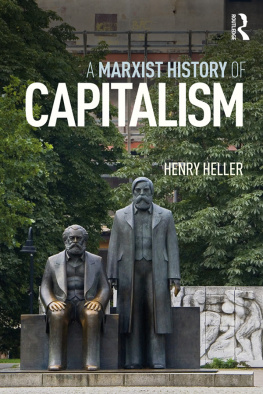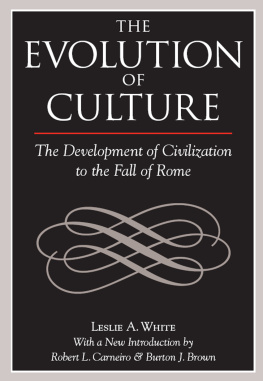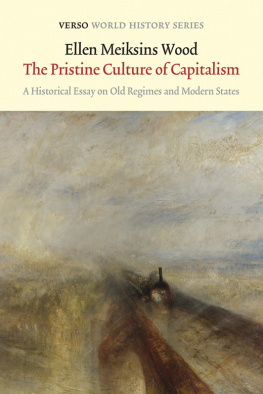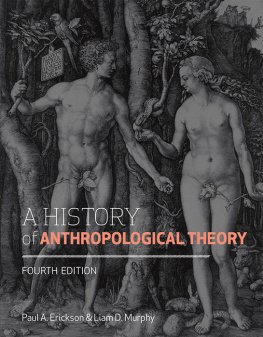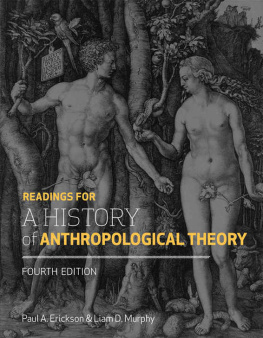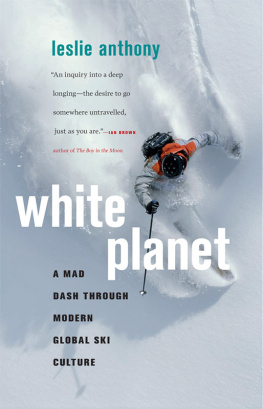First published 2008 by Left Coast Press, Inc.
Published 2016 by Routledge
2 Park Square, Milton Park, Abingdon, Oxon OX14 4RN
711 Third Avenue, New York, NY 10017, USA
Routledge is an imprint of the Taylor & Francis Group, an informa business
Copyright 2008 Taylor & Francis
All rights reserved. No part of this book may be reprinted or reproduced or utilised in any form or by any electronic, mechanical, or other means, now known or hereafter invented, including photocopying and recording, or in any information storage or retrieval system, without permission in writing from the publishers.
Notice:
Product or corporate names may be trademarks or registered trademarks, and are used only for identification and explanation without intent to infringe.
Library of Congress Cataloging-in-Publication Data
White, Leslie A., 1900-1975.
Modern capitalist culture / Leslie A. White ; edited and foreword by Robert L. Carneiro, Ben Urish, and Burton J. Brown.
p. cm.
Includes bibliographical references.
ISBN 978-1-59874-157-5 (hardback : alk. paper)
1. Capitalism. 2. Culture. 3. Social structure. I. Carneiro, Robert L. (Robert Leonard), 1927- II. Urish, Ben. III. Brown, Burton J. IV. Title.
HB501.W494 2008
306.342--dc22
2008019847
Cover design by Lisa Devenish
ISBN 13: 978-1-59874-157-5 (hbk)
Robert L. Carneiro, Ben Urish, and Burton J. Brown
When Leslie White began his professional career in 1927, after receiving his Ph.D. from the University of Chicago, the field of anthropology was narrowly empirical in its focus. A decided disinclination to engage in theory was characteristic of it, and toward cultural evolution in particular there was outright hostility. What few attempts were made by anthropologists to deal with broad-gauged theory or engage in evolutionary reconstructions were belittled and decried. Having been trained in this tradition, White at first held these views himself and taught them to his students at the University of Buffalo, his first teaching position.
But several experiences White had early in his professional career caused him at first to reconsider these views, and then ultimately to modify or discard them. One such experience was becoming acquainted with the writings of Lewis H. Morgan, the father of American anthropology. The city of Buffalo, where White was teaching, was close to the Tonawanda Indian Reservation, where Morgan had studied the Iroquois and later written a monograph about them. In addition to this monograph, White read Morgans most influential work, Ancient Society, and found in it a positive portrayal of cultural evolution. Its depiction, in fact, made it seem a far more reasonable and illuminating approach to the study of culture than his teachers had led him to believe.
Whites students at the University of Buffalo were also instrumental in causing him to change his ideas. They were, White later wrote, very intelligent and alert. He had tried to teach them anti-evolutionism, just as he had been taught himself, but found that they resisted his efforts. Of their effect on his views he later wrote: They pushed me into a corner. Before long I had realized that I could not defend the doctrines of anti-evolutionism; then I realized that I could no longer hold them; they were untenable (White 1987:13).
Whites new espousal of cultural evolution was further strengthened by a visit he made to the Soviet Union, where Morgan was regarded as a socialist saint, and where Ancient Society was widely read and highly regarded. A colleague of Whites at the University of Buffalo, a philosopher named Marvin Farber, also influenced White toward a fuller acceptance of cultural evolution and of socialism as well.
Once he had fully reembraced evolution, White turned his consummate skills at writing and argumentation toward rehabilitating the concept and getting it reaccepted in American anthropology. This attempt, which ultimately succeeded, initially faced stiff opposition and was accomplished against great odds. It was carried out largely through a series of trenchant articles, most of which appeared in the American Anthropologist and the Southwestern Journal of Anthropology (now the Journal of Anthropological Research).
For many years, White found himself a virtual outcast in his profession, regarded as a maverick by many of his colleagues. He once even suffered the ignominy of being psychoanalyzed to his face by Ruth Benedict, who regarded his unconventional opinions as indicating some kind of personality disorder. The relentless opposition and even ridicule White faced during the early decades of his career left him beleaguered and embattled, but at the same time helped hone his incisive and combative style of writing.
In 1930 White left the University of Buffalo and moved to the University of Michigan, where he continued to promote not only cultural evolution, but ethnological theory generally. Indeed, in his later years White was generally regarded as the leading anthropological theorist in his profession. He instilled in his students the idea that anthropology was a science, like any other, to be pursued with objectivity and energy. White illustrated this approach persuasively in his book The Evolution of Culture but also suggested that this volume was to be the first of three. In the introduction to that book White wrote:
The present volume will take the reader to the collapse of the Roman state. We propose to follow this work with a study of the Fuel Revolution and its institutional concomitants. And finally, we hope to project the curve of a million years of cultural development in a modest way and to a limited extent in a third volume on Recent Trends and Future Probabilities: 19582058.
The Fuel Revolution never saw the light of print. The third volume came to absorb Whites attention, with occasional interruptions, from 1959, when The Evolution of Culture was published, until Whites death in 1975. During that time, the work expanded enormously so that at his death it had grown to no fewer than 1,400 manuscript pages. The coverage of the work had changed too. The volume you have before you began its life as the third volume referred to in the above quotation but rather than trying to project general trends in cultural development into the future, White had narrowed his scope to a study of capitalism. At the same time White deepened its coverage to penetrate into almost every aspect of capitalist systems. This volume reads almost encyclopedically covering numerous topics such as mutual funds, subsidies, and pensions. It is also a remarkable history of the rise and development of capitalism and many of its defining industries, movements and directions. Thus, the final title of the manuscriptand of the present book to which this foreword is a partis Modern Capitalist Culture.
Ironically, White was no great friend of capitalism. Indeed, beginning in the 1930s, inspired partly by his visit to the Soviet Union, he became strongly drawn to socialism. In a secretive part of his life, not actually made known to the academic world until the publication of William Peaces biography of him in 2004, White was for years an active member of the Socialist Labor Party in the United States. The partys ideological lion, though, was Daniel de Leon rather that Nikolai Lenin. During this period of his life, White became very familiar with the writings of Marx and Engels, and in fact told intimates that he had read the first chapter of



